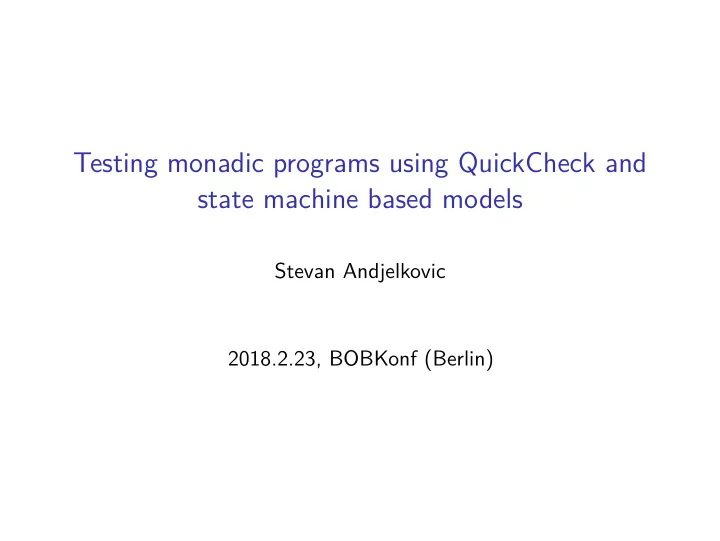

Testing monadic programs using QuickCheck and state machine based models Stevan Andjelkovic 2018.2.23, BOBKonf (Berlin)
Introduction ◮ Property based testing in general ◮ How to apply property based testing to stateful and concurrent programs ◮ Running example, simple CRUD web application ◮ Familiar type of program ◮ Obviously stateful and concurrent ◮ Non-obvious property? ◮ Using the quickcheck-state-machine Haskell library, but the principles are general
Overview ◮ Reminder ◮ What are property based tests? ◮ Why are they so effective? ◮ Basic idea and motivation behind how the library applies property based testing principles to stateful and concurrent programs ◮ Demo ◮ Sequential property (catches logic and specification bugs) ◮ Concurrent property (catches race conditions) ◮ Comparison to other tools
Property based testing ◮ Unit tests test :: Bool test = reverse (reverse [1,2,3]) == [1,2,3] ◮ Property based tests prop :: [Int] -> Bool prop xs = reverse (reverse xs) == xs
Property based testing ◮ Unit tests test :: Bool test = reverse (reverse [1,2,3]) == [1,2,3] ◮ Property based tests prop :: [Int] -> Bool prop xs = reverse (reverse xs) == xs ◮ Proof by (structural) induction ∀ xs (reverse(reverse( xs )) = xs )
Property based testing ◮ Unit tests test :: Bool test = reverse (reverse [1,2,3]) == [1,2,3] ◮ Property based tests prop :: [Int] -> Bool prop xs = reverse (reverse xs) == xs ◮ Proof by (structural) induction ∀ xs (reverse(reverse( xs )) = xs ) ◮ Type theory proof : forall xs -> reverse (reverse xs) == xs
Stateful programs, basic idea / motivation ◮ Take inspiration from physics ◮ Simplified model of reality that can predict what will happen ◮ Experiments against reality validate the model ◮ How do we model algorithms/programs? ◮ Gurevich’s abstract state machines/new thesis, think of finite state machines where the states are arbitrary datatypes ◮ Abstract state machines are used by: ◮ Quiviq’s closed source version of QuickCheck for Erlang (Volvo cars, . . . ) (Claessen et al. 2009) ◮ Z/B/Event-B familiy (Paris metro line 14) ◮ TLA+ (AWS, XBox) ◮ Jepsen (MongoDB, Cassandra, Zookeeper, . . . )
The quickcheck-state-machine library ◮ Use abstract state machine to model the program ◮ A model datatype, and an initial model ◮ A datatype of actions (things that can be happen in the system we are modelling) ◮ A transition function that given an action advances the model to the next state ◮ A semantics function that takes an action and runs it against the real system ◮ Use pre- and post-conditions on the model to make sure that the model agrees with reality (Floyd 1967; Hoare 1969) ◮ Use QuickCheck’s generation to conduct experiments that validate the model ◮ Sequential property ◮ Parallel/concurrent property (linearisability, Herlihy and Wing 1990)
State machine model
Demo ◮ Simple web application ◮ data User { name :: Text, age :: Int } ◮ Create user (post request) ◮ Read/lookup user (get request) ◮ Update age (put request) ◮ Delete user (delete request) ◮ Implementation ◮ Servant and persistant ◮ Could be written using any libraries or language ◮ Completely independent of quickcheck-state-machine ◮ Specification ◮ Uses the quickcheck-state-machine library in the way described above
Demo
Linearisability (fails) ◮ (Herlihy and Wing 1990)
Linearisability (succeeds)
Comparison to other tools ◮ Quiviq’s Erlang QuickCheck ◮ More polished and used ◮ Better statistics ◮ Closed source ◮ Z/B/Event-B ◮ Deductive proving (heavily automated) ◮ Refinement ◮ Notation ◮ TLA+ ◮ Model checking (proving is also possible) ◮ Liveness and fairness properties can be expressed ◮ No connection to actual implementation ◮ Jepsen ◮ Does fault injection (e.g. network partitions) ◮ No shrinking (is it even possible?)
Conclusion ◮ State machines are useful for modelling programs ◮ Race condition testing for free via linearisability ◮ See also ◮ quickcheck-state-machine library on GitHub ◮ Oskar’s talk ◮ Matthias’ tutorial
References Claessen, Koen, Michal H. Palka, Nicholas Smallbone, John Hughes, Hans Svensson, Thomas Arts, and Ulf T. Wiger. 2009. “Finding Race Conditions in Erlang with QuickCheck and PULSE.” In Proceeding of the 14th ACM SIGPLAN International Conference on Functional Programming, ICFP 2009, Edinburgh, Scotland, UK, August 31 - September 2, 2009 , edited by Graham Hutton and Andrew P. Tolmach, 149–60. ACM. doi:10.1145/1596550.1596574. Floyd, R. W. 1967. “Assigning Meanings to Programs.” In Mathematical Aspects of Computer Science, Proceedings of Symposia in Applied Mathematics 19 , edited by J. T. Schwartz, 19–32. Providence: American Mathematical Society. Herlihy, Maurice, and Jeannette M. Wing. 1990. “Linearizability: A Correctness Condition for Concurrent Objects.” ACM Trans. Program. Lang. Syst. 12 (3): 463–92. doi:10.1145/78969.78972. Hoare, C. A. R. 1969. “An Axiomatic Basis for Computer Programming.” Communications of the ACM 12 (10): 576–80, 583.
Recommend
More recommend